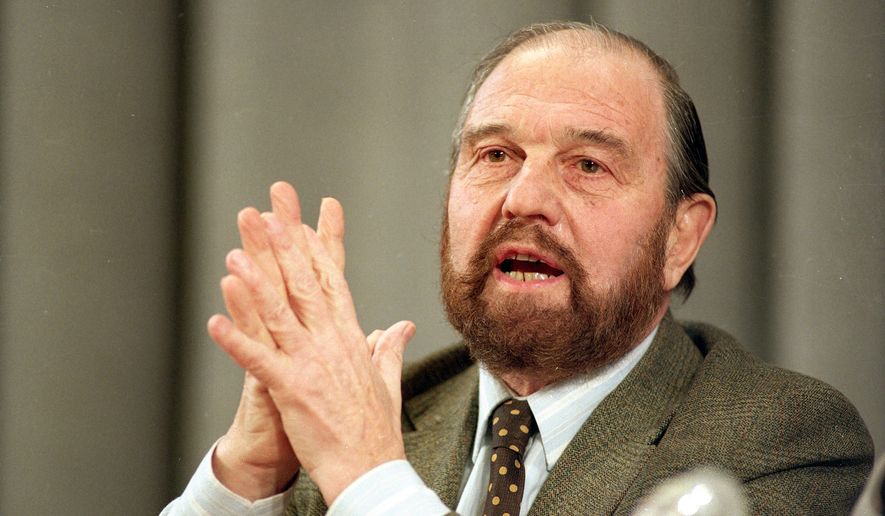OPINION:
Steve Vogel is the author of “Betrayal in Berlin: The True Story of the Cold War’s Most Audacious Espionage Operation,” which I reviewed in these pages. The book covered the dramatic story of the CIA and the British Secret Intelligence Service’s attempt to tap Soviet telephone lines by building a tunnel in Berlin during the Cold War.
But the bold plan was blown from the start. An SIS officer named George Blake was a Soviet spy and he informed the Soviets. To protect their valuable spy, the Soviets allowed the tunnel to be built. The West gained much intelligence before the Soviets publicly uncovered the tunnel.
The book covers many interesting people from the era, and although I despise the Soviet spy, I was most interested in George Blake. Blake lives in Russia today under the protection and public admiration of former KGB officer and Russian leader Vladimir Putin, who calls him every year on his birthday.
I contacted Steve Vogel and asked him about his interview with George Blake.
“My dad was a case officer with the CIA, and I was born in Berlin in 1960,” Mr. Vogel said. “Too late for the tunnel, but in time for the Berlin Wall, which my dad said was put up to keep me out.”
He said he was back in Berlin in 1989 as a reporter and saw the fall of the Berlin Wall. He covered many Cold War spy stories, including the trial of East German Stasi spymaster Markus Wolf.
Steve Vogel said his father died in 1986 and hearing stories from his father’s retired CIA friends, he thought this was a good time to write a story about Cold War Berlin.
“When I started the book, I was focusing on the tunnel, but it’s hard not to get sucked into the George Blake story. He was a fascinating figure, one of the great espionage stories of the 20th century,” Mr. Vogel said. “He led a storybook life. He was born in Holland and his father was a Turk who fought for the British Army in World War I, became a citizen and married a Dutch woman.”
Blake’s father died when he was young, and he was sent to Egypt to live with his father’s wealthy relatives. Mr. Vogel suspects Blake came under the spell of his cousin, who was later the founder of the Egyptian Communist Party. He was in Holland as a schoolboy when the Nazis invaded, and he served with the Dutch Resistance. He feared arrest due to his part-Jewish blood as well as being a British citizen, so he escaped to Spain and later to England, where he joined the Royal Navy.
As he spoke several languages and his experience with Dutch Resistance, he was recruited into British intelligence. After WWII, he was sent to Korea a year before the war broke out. At the beginning of the war, he was taken prisoner. He was held for three years and at some point, Mr. Vogel said, he decided to turn sides.
Blake said he had given up on religion and communism filled that void, so he reached out to Soviet intelligence. He spied for the Soviets from 1953 to 1961 when he was arrested for espionage. He was sentenced to 42 years in prison, but with the help of fellow prisoners who had been released, he escaped in 1966 and fled to the Soviet Union.
“I had to try to speak to Blake. I thought the best thing to do, rather than go through Russian intelligence, was to call him out of the blue,” Mr. Vogel recalled. “He was pleasant enough and we had a decent chat, but he didn’t want to talk for long.
“I went to Berlin to do interviews and then went on to Blake’s dacha outside of Moscow, an area where many KGB officers have their dachas.”
He knocked on the gate and was told the 95-year-old was bedridden and couldn’t meet with anyone. But Blake’s wife said she would later set up a telephone interview. A couple of weeks later, Mr. Vogel had a long, detailed telephone interview with Blake.
“He has a certain charm, which made him effective as a spy. He’s disarming in conversation as he has a knack for getting people to like and trust him,” Mr. Vogel said. “He is studiously careful not to take on a bragging tone, even though he’s clearly pleased with the work he did. He said he was not a traitor or a spy. He tries to circumvent this narrow line down the middle by saying he was doing his duty.
“Blake was one of the major figures in espionage,” Mr. Vogel said.
• Paul Davis’ On Crime column covers true crime, crime fiction, mysteries and thrillers.




Please read our comment policy before commenting.